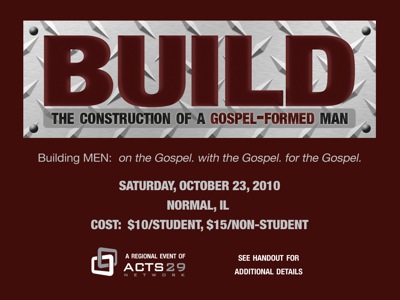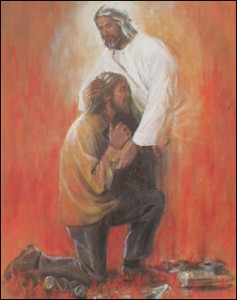 John Piper was recently presented with a festschrift called For the Fame of God’s Name, in which pastors and scholars contribute 27 chapters, totaling 508 pages, in honor of Piper’s God-centered life and ministry. New Testament scholar D.A. Carson made a considerable contribution in his chapter “What is the Gospel?–Revisited” (free by clicking on Sample Pages). This chapter will prove essential in clarifying positions and understandings of the meaning and scope of the Gospel of Jesus Christ. Though at times technical, this work is worth the read. After all, it doesn’t get more foundational or monumental than the Gospel!
John Piper was recently presented with a festschrift called For the Fame of God’s Name, in which pastors and scholars contribute 27 chapters, totaling 508 pages, in honor of Piper’s God-centered life and ministry. New Testament scholar D.A. Carson made a considerable contribution in his chapter “What is the Gospel?–Revisited” (free by clicking on Sample Pages). This chapter will prove essential in clarifying positions and understandings of the meaning and scope of the Gospel of Jesus Christ. Though at times technical, this work is worth the read. After all, it doesn’t get more foundational or monumental than the Gospel!
Below I set up some important quotations from Carson’s chapter that help us clarify just what the Gospel is.
The Kingdom Gospel vs. The Salvation Gospel
Some have identified a “Gospel of the Kingdom” in contrast to a “Gospel of Salvation.” Carson explains why a distinction between the “individual” and “communal”, the saving and the kingdom gospel is artificial. His main point is that the Gospel of the Kingdom is something that is heralded by Jesus on his way to complete the Gospel Story. In other words, the Gospel of the Kingdom announced by Jesus in the Gospels can only be announced because of where Jesus is headed in the Gospels, namely to the cross and to the resurrection. To interpret it otherwise is backwards hermeneutics. He writes:
That is why it is so hermeneutically backward to try to understand the teaching of Jesus in a manner cut off from what he accomplished; it is hermeneutically backward to divorce the sayings of Jesus in the Gospels from the plotline of the Gospels. p. 160
Are the Narrow & Broad Two Gospels?
Carson then enters into a discussion of the narrower and broader foci of the Gospel. He points out that the narrower focuses on Jesus’ story (cross/resurrection) and the latter focuses on what Jesus’ story has secured (kingdom/new creation). Some have protested that there is too much focus on the former and that we need to focus more on the “gospel of the kingdom.” Carson points out that this reasoning assumes there are two gospels, to which he replies:
But this means that if one preaches the gospel in the broader sense without also emphasizing the gospel in the more focused sense of what God has done to bring about such sweeping transformation, one actually sacrifices the gospel. (emphasis added) p. 162
The Gospel is not Just for Non-Christians but for Christians
Preaching the gospel, it is argued, is announcing how to be saved from God’s condemnation; believing the gospel guarantees you won’t go to hell. But for actual transformation to take place, you need to take a lot of discipleship courses, spiritual enrich- ment courses, “Go deep†spiritual disciplines courses, and the like. You need to learn journaling, or asceticism, or the simple lifestyle, or Scripture memorization; you need to join a small group, an accountability group, or a women’s Bible study. Not for a moment would I speak against the potential for good of all of these steps; rather, I am speaking against the tendency to treat these as postgospel disciplines, disciplines divorced from what God has done in Christ Jesus in the gospel of the crucified and resurrected Lord. (emphasis added) p.165


 Removing the Sacred from the City
Removing the Sacred from the City I’m reminded this morning that repentance is always good news. It is the reminder of Christ’s profound love for us, that God has accepted and forgiven otherwise unacceptable and unforgivable sinners. Jesus said to the church at Laodicea: “Those whom I
I’m reminded this morning that repentance is always good news. It is the reminder of Christ’s profound love for us, that God has accepted and forgiven otherwise unacceptable and unforgivable sinners. Jesus said to the church at Laodicea: “Those whom I